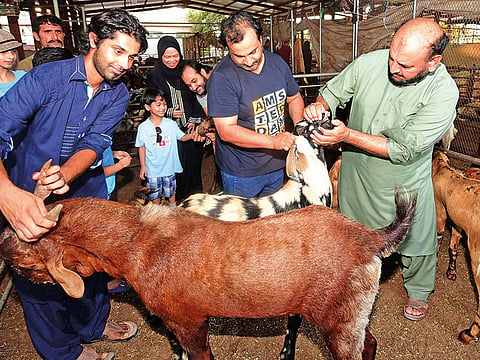‘A small sacrifice to wait in Eid slaughter lines’
People facing long queues to offer their sacrifices say ‘it’s worth the wait’

Dubai: Traders at Dubai’s livestock market in Al Qusais did brisk business on the first day of Eid Al Adha, as residents lined up to buy sacrificial animals on Tuesday.
The crowd steadily built up at the market and the adjoining abattoir, from as early as 7am, as early birds hurried straight from the Eid prayers to beat the rush.
Sacrificing animals — mostly goats and sheep as well as oxen and bulls — is the central activity of the Eid Al Adha festival, with believers offering their sacrifices in commemoration of Prophet Ebrahim’s willingness to follow God’s command and sacrifice his son Esmail.
Traditionally, believers keep a portion of the meat from the sacrificial animals for themselves, while the rest is distributed among friends and donated to the poor.
There are also those who donate most of the meat to the poor. Egyptian expat Omar Salem, 26, purchased a bull for sacrifice and plans to keep only a small portion for himself. “I will only keep a small portion of the meat for a feast with family and friends, the rest will go to charity. This is my idea of sacrifice. When we are celebrating, we should remember the poor who can’t afford the blessings we enjoy. This is what our Prophet Mohammad taught us,” said Salem, a banker.
On Tuesday, long and winding lines of vehicles carrying sacrificial animals could be seen entering the abattoir till as late as 2pm, with many hoping to get their animals cut, cleaned and packed in time for a lunch of biryani or barbecue with family and friends.
Pakistani expatriate Muaz Humayun purchased a goat early on Tuesday morning, hoping to get the process completed in time for a family feast. “I came here at 10am and it has been two hours now since I bought the animal. We have been waiting in queue, but it’s moving steadily. I can’t wait to get the meat and go back home where we have people waiting for a biryani feast,” said Humayun, speaking to Gulf News as he walked alongside the truck loaded with his animal.
Another expatriate, Mir Javed, who has lived all his life in the UAE, said he comes to the abattoir every year during Eid Al Adha. “It is part of the ritual that we have every year and waiting in the queue is just a small sacrifice, as we commemorate the noble gesture of Prophet Ebrahim,” said Javed, as he sat with his animal in the open pick-up truck, little bothered by the heat.
The cattle market was buzzing with activity as traders made the most of the annual hike in demand, with goats and sheep selling in the range of Dh3,000 to Dh5,000, while bulls and oxen were going for Dh5,000 to Dh10,000. “We are doing good business this year and the demand is better than last year. I have already sold half the 1,000 heads of goats and sheep I imported, and I hope to sell the remaining half in the next two days,” said Noor Mohammad, owner of Al Shindagha Cattles.
Another trader, Mohammad Shahid, also seemed happy with the market situation this year. “Our first day has been better than expected. We are doing brisk business and we hope to sell out by tomorrow [Wednesday],” said Shahid, who runs his father’s 35 year old cattle business.
This year, buyers can choose from a greater variety of cattle, as Pakistani animals — a much sought of after breed — are available after an absence of more than five years.



